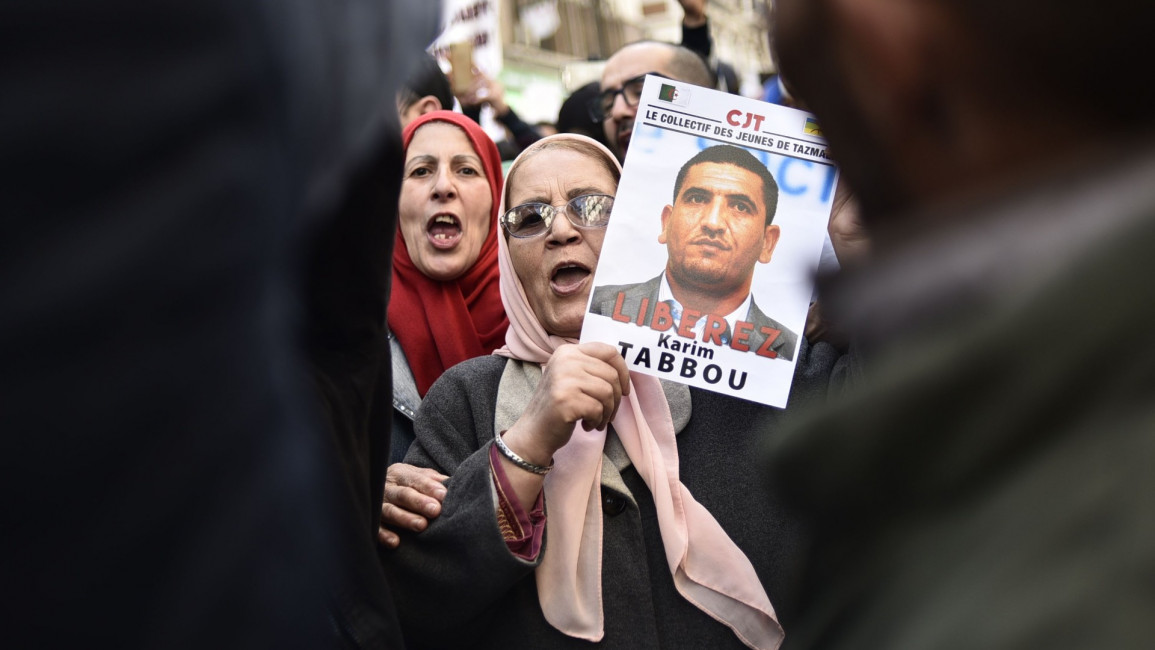Algerian political leader Karim Tabbou 'deprived' of family phone calls in prison
Algerian political leader Karim Tabbou 'deprived' of family phone calls in prison
Karim Tabbou has reportedly been repeatedly prevented from phoning his family, and his lawyers are calling it a violation.
3 min read
Karim Tabbou is a hero in the Hirak movement [Getty]
Karim Tabbou has been in detention for more than six months for his activism and now the Algerian political leader is being denied contact with his family, his legal team revealed.
Tabbou had made three requests to phone his family, on 4 April, 10 April and 6 May, according to his lawyers, all of which were denied.
"The prohibition of the right to make a phone call is in total contradiction with the law on prison organisation, and in particular Article 72 which specifies the means of distance communication and their use by prisoners," they said.
Referring to it as a "ban", they said the move "enshrines the policy of isolation of activist Karim Tabbou, and constitutes a form of cruel treatment on the psychological level".
This comes after prison authorities cancelled family visits with prisoners to prevent the spread of coronavirus.
The defence collective condemned "this discriminatory act against" Karim Tabbou and informed public opinion of the "abuses of which he is the victim", demanding "equity, justice and the correct application of legal texts without any discrimination, and far from any political calculation".
Karim Tabbou, the founder of the Social and Democratic Union party - which has been banned in Algeria - was first arrested in September after he took part in a conference calling for the rejection of the December presidential elections.
His charges included "harming army morale", "undermining national unity" and "inciting violence". Much of his pre-trial detention has been spent in solitary confinement.
The Algiers court sentenced Tabbou to six months behind bars as well as a six month suspended sentence.
Having almost completed six months in prison, Tabbou was expected to be released at the end of March to serve his suspended sentence.
|
However, on 24 March 2020 Tabbou was sentenced to another year in prison and a fine of 50,000 Algerian dinars (around 405 USD) for trumped up charges of "incitement to violence" and "harming national security" in relation to a speech he gave, in a video published on the political party's Facebook page, where he peacefully criticised the role of the army in politics.
Tabbou has been held in prolonged solitary confinement since his arrest in September 2019.
The prosecution had originally sought a four-year prison sentence and 200,000 dinar fine ($1,700).
Since the presidential election in December, which protesters largely denounced as a sham, at least 76 protesters have been arbitrarily detained.
Among those arrested include civil society activists, journalists and political leaders, who face charges such as "harming national security", "harming the army's morale" and "offending public officials".
"The Algerian authorities are deploying the threat of criminal trials against dozens of peaceful protesters, apparently in a bid to intimidate and silence critical voices," said Amnesty International's Research and Advocacy Director for the Middle East and North Africa, Philip Luther, in a statement.
"The use of trumped-up charges related to national security and the military is particularly outrageous," he added.
"Persecuting peaceful protesters is certainly not the response Algerians who have taken to the streets and demanded wide-ranging reforms were waiting for."
Protests which broke out against the authoritarian regime in February 2019 successfully toppling President Abdelaziz Bouteflika but the old military regime continues to wield power.
The total number of prosecutions of peaceful protesters has exceeded 1,400 since February 2019, according to local human rights groups and lawyers.



